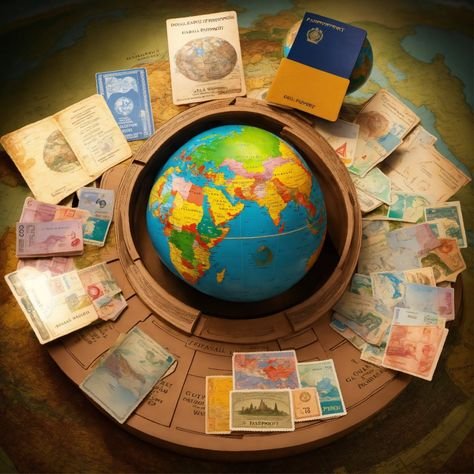Indian Tourist Visa Guide: Essential Information for Travelers

If you’re planning to visit India for tourism, obtaining the right visa is one of the most important steps in your travel preparation. The Indian tourist visa guide will provide you with all the essential information on how to apply, what to expect, and what documents you’ll need to make your journey smooth and hassle-free. Understanding the process can save you time and help you avoid unexpected issues when traveling.
Understanding the Indian Tourist Visa
The Indian tourist visa allows foreign nationals to visit India for tourism purposes. Whether you’re looking to explore the rich cultural heritage, the diverse landscapes, or the vibrant cities of India, having the correct visa is crucial. This visa is typically issued for a duration ranging from 30 days to 10 years, depending on the applicant’s nationality and the purpose of the visit.
For many countries, India offers an electronic visa (eVisa), which simplifies the process significantly. However, not all countries are eligible for the eVisa program, so it’s important to check your eligibility before starting the application.
Types of Indian Tourist Visas
The Indian tourist visa guide categorizes the types of visas available for tourists. Some of the main options include:
- eTourist Visa (eVisa)
The eTourist visa is one of the most popular and convenient ways to obtain a tourist visa for India. This visa can be applied for online, and travelers do not need to visit an embassy or consulate. The eVisa is typically valid for 30 days, 60 days, or 90 days, depending on the applicant’s nationality. It allows you to travel to India for sightseeing, meeting friends or relatives, or attending short-term yoga or cultural programs. - Tourist Visa on Arrival
India also offers a Tourist Visa on Arrival for citizens of certain countries. This type of visa allows travelers to get their visa upon arrival at designated airports in India. However, this option is less common than the eVisa. - Regular Tourist Visa
If you’re not eligible for the eVisa or prefer a more traditional route, you can apply for a regular tourist visa at the Indian embassy or consulate in your country. This visa can be issued for durations ranging from 6 months to 10 years, depending on your nationality.
Eligibility Criteria for the Indian Tourist Visa
Before applying for an Indian tourist visa, it’s essential to ensure you meet the eligibility requirements. The Indian tourist visa guide lists the basic criteria:
- Passport validity: Your passport should be valid for at least 6 months from the date of entry into India.
- Proof of funds: You may need to provide proof that you have sufficient funds for your stay in India.
- Travel itinerary: You may be required to submit details of your travel plans, such as flight bookings and hotel reservations.
- No criminal record: Applicants must not have a criminal history or pending criminal charges in their home country.
How to Apply for an Indian Tourist Visa

The process for applying for an Indian tourist visa will vary depending on the type of visa you’re applying for. Here’s a step-by-step guide to the most common application methods:
- eVisa Application Process
- Visit the official Indian government website for eVisa applications.
- Complete the online application form with personal details, travel dates, and passport information.
- Upload a recent photograph and a scan of your passport’s bio page.
- Pay the visa fee online using a credit or debit card.
- Wait for your eVisa approval, which typically takes 3 to 5 business days.
- Upon approval, you will receive an electronic travel authorization (ETA), which you must present upon arrival in India.
- Regular Tourist Visa Application
- Visit your nearest Indian embassy or consulate website to find out the required documents and fees.
- Submit your application form along with your passport, photos, and other supporting documents, such as flight and hotel bookings.
- Attend an interview at the consulate if necessary.
- Wait for the visa to be processed, which may take several weeks.
Required Documents for Indian Tourist Visa
The Indian tourist visa guide outlines the documents that you need to submit when applying for your visa:
- A valid passport with at least six months of validity beyond your planned date of departure from India.
- Recent passport-sized photographs, meeting the specifications set by the Indian authorities.
- Proof of your travel plans, including flight tickets and hotel bookings.
- For regular visa applications, proof of financial stability (such as bank statements) may be required.
Processing Time and Fees for Indian Tourist Visas
The processing time and fees for an INDIAN VISA QUESTIONS can vary depending on the type of visa and the applicant’s nationality.
- eVisa applications are typically processed within 3 to 5 business days.
- Regular tourist visa applications can take anywhere from 7 to 20 days, depending on the embassy’s workload and the nationality of the applicant.
Visa fees also differ based on the type of visa and the applicant’s nationality. It’s important to check the updated fee structure on the official website before applying.
Important Tips for Travelers
To make your experience with the Indian tourist visa guide even smoother, here are a few essential tips:
- Check your eligibility for an eVisa: Before starting the application, verify that your country is eligible for the eVisa program.
- Apply in advance: While eVisas are relatively quick to process, it’s always advisable to apply well ahead of your planned travel dates.
- Ensure accuracy: Double-check all the information on your application form and documents to avoid delays or rejection.
- Travel Insurance: It’s a good idea to purchase travel insurance to cover any unexpected medical expenses or travel disruptions.
Conclusion
Navigating the Indian tourist visa guide can seem overwhelming at first, but with the right information and preparation, the process becomes relatively straightforward. Whether you’re applying for an eVisa, a regular tourist visa, or a tourist visa on arrival, understanding the requirements and steps involved will make your trip to India much more enjoyable. Always ensure that your passport is valid, your documents are in order, and your application is submitted in a timely manner to avoid last-minute stress.








